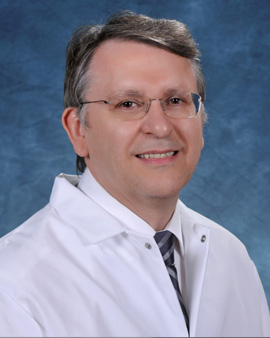
Alexander Mazin, PhD
For as long as he can remember, Alexander Mazin has been driven by his need to understand exactly how things work. "I've always been interested in basic, mechanistic issues, and that goes all the way back to my training," says Mazin, a professor in the Department of Biochemistry & Molecular Biology. At Drexel, that curiosity about basic processes may very well lead to a new approach to anticancer therapy.
Mazin's primary research area is the mechanisms of DNA double-stranded break repair in humans and yeast. By design, DNA provides the means for its own repair, a process that is necessary for human survival, for protecting our genes and normal cells while inhibiting the growth of cancer cells. "One strand of DNA serves as a template to repair the other when it's damaged by radiation, chemicals in our food supply or even the normal process of breathing oxygen," Mazin says. "But what happens when both strands are damaged? The only way to repair the DNA in that scenario is to use another piece of DNA that complements it. The trick, of course, is to find that other piece of DNA."
KEY PROTEIN PROMOTES REPAIR
This work originated during Mazin's PhD inquiries at the Institute of Cytology and Genetics at the Russian Academy of Sciences, where he studied site-directed mutagenesis using complementary DNA that carried reactive groups to the genome targets. "That work really opened my eyes. Once I was able to specifically damage a target, I became especially interested in how modified DNA gets repaired by cell enzymes," Mazin says.
Mazin continued his studies in France and later at the University of California, Davis, as a postdoctoral research fellow under Stephen Kowalczykowski, who was instrumental in preparing Mazin to run his own lab. "He has a profound understanding of experimental work and I took many lessons from him," Mazin says. "Even today, I continue to discuss these issues with him regularly."
At UC Davis, Mazin homed in on a key protein in bacteria called RecA. "This protein promotes repair of DNA that is broken by radiation. To accurately repair double-stranded DNA we can use the template of homologous dsDNA. The problem remains, how to find the template in a huge genome environment — it is truly the search for a needle in a haystack."
A DOUBLE-EDGED SWORD
The process of homologous recombination is a double-edged sword, biochemically speaking: It contributes to the quickly proliferating cells associated with cancer, and yet it may also protect against the cell damage associated with anticancer therapies such as radiation and chemotherapy.
As such, Mazin believes that proteins like RAD51, RAD52, RAD54 and others might be the key to developing small molecule inhibitors of these processes. In hereditary breast cancer, for instance, researchers have established that there is a deficiency of the homologous recombination proteins. "If we can understand the mechanisms that help repair cells and determine how we can control their proliferation, this work can have enormous practical value." The goal, Mazin says, is to develop a less toxic anticancer drug, one that could make existing cancer therapies more efficient.
DISCOVERING THE ANSWERS
So far, Mazin's lab is working to purify the key proteins and then use them to reconstitute the process of human DNA repair in a test tube. "We can use this biochemical approach to generate mechanistic data," he says. "Eventually, we will use a cellular approach, developing a specific molecule to observe the recombination process through an assay system and later in an in vivo environment." Using their basic science findings as a guideline, Mazin's group, in collaboration with the Broad Institute of MIT and Harvard, and the Penn Center for Molecular Discovery, is developing specific small molecule inhibitors of the proteins of homologous recombination. From there, Mazin and his collaborators can track the cancerous cells and determine whether the proteins are inhibiting their growth.
Over the past 15 years, Mazin has found that his work at Drexel has been well supported by both colleagues and the school's administration. "There's a true level of commitment, not just financially but also in terms of the stimulating, friendly environment," he says.
His ongoing study and its potential implications in the fight against cancer demonstrate to Mazin the beauty of science and what drew him to become a researcher in the first place — the fact that the answers are already there, waiting to be discovered. "Science is inherently useful," he says. "It's up to us to make our findings applicable and use them to help solve some of the biggest problems we humans face."